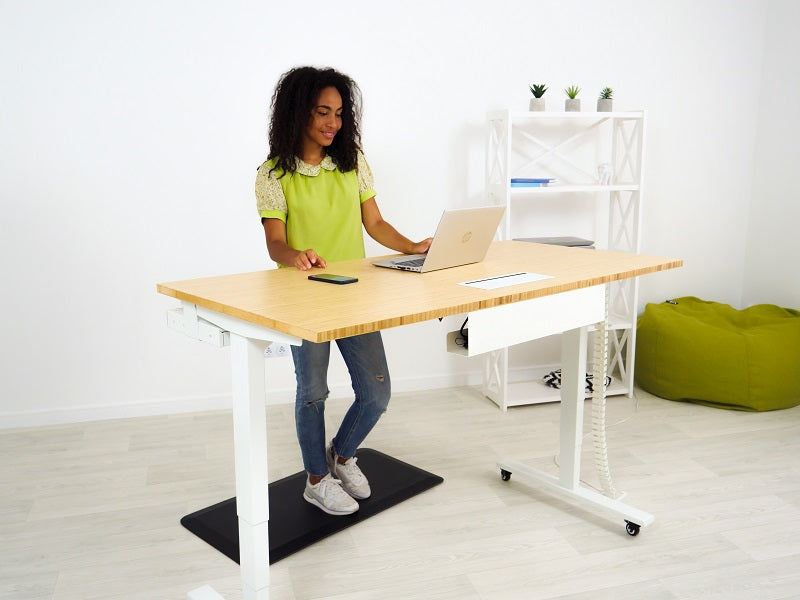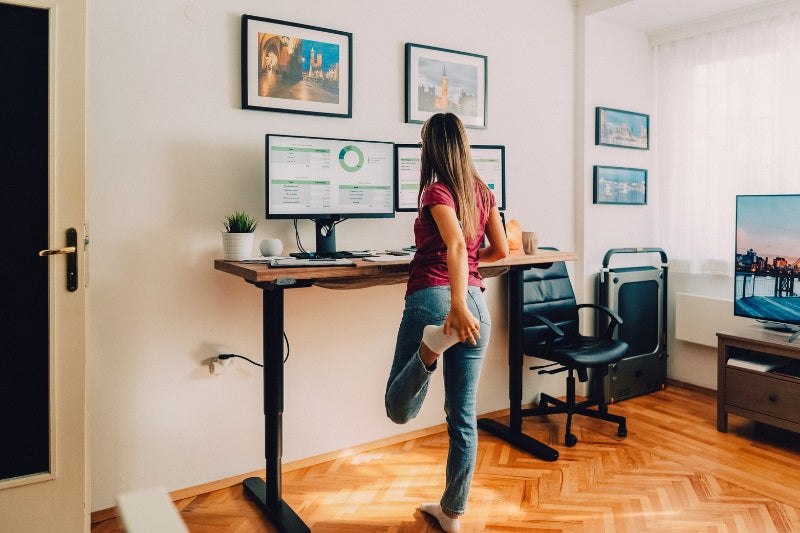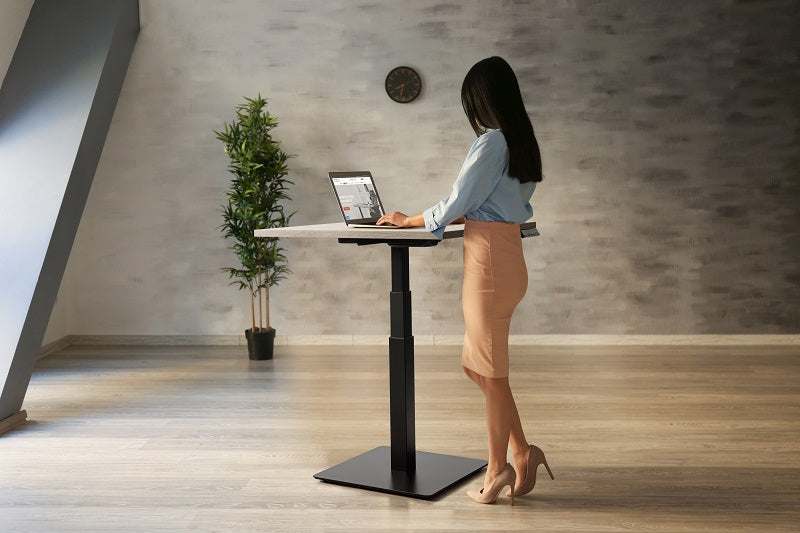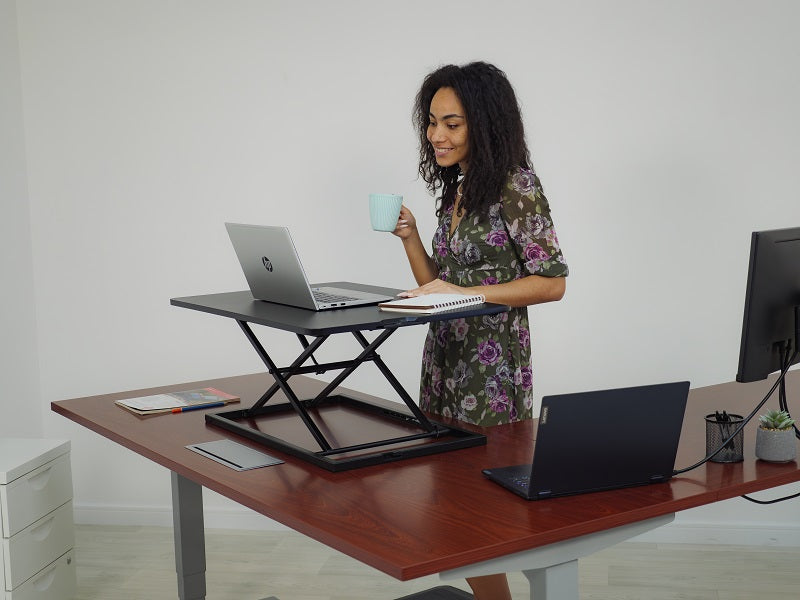Standing or adjustable desks are becoming more popular in the workplace as a way to promote health and wellness among employees. They allow users to alternate between sitting and standing, which can help reduce the risks of sedentary lifestyle, such as obesity, diabetes, cardiovascular disease, and musculoskeletal disorders. Adjustable desks can also improve energy levels, productivity, creativity, and mood.
But how exactly do these types of desks affect our psychological well-being? What are the mechanisms behind the positive effects of standing on our mental health? In this article, we will explore the psychological standing desk benefits, such as reduced stress and improved mood, and provide insights into the science behind these effects.

Reduced Stress and Fatigue
One of the most common complaints of those who spend their days in the office is stress and fatigue. Stress can have negative impacts on our physical and mental health, lowering the immune system, impairing memory and concentration, and increasing the risk of depression and anxiety. In turn, accumulated fatigue can also affect our work performance, motivation, and satisfaction.
Here is how standing desks can help fatigue and stress reduction. When we sit for a long time, we tend to slouch and hunch over, which can cause tension and pain in our neck, shoulders, and back and affect our breathing, blood circulation, and mood. But, when we stand, we can maintain a more natural and upright posture, relieving pressure and discomfort in our muscles and joints. Standing can also enhance breathing, blood flow, and oxygen delivery to our brain and body, boosting energy and alertness.

Several studies have shown that sit-stand desks contribute to mental health improvement among office employees. In one 7-week study, participants using standing desks reported less stress and fatigue than those who remained seated the entire workday. Additionally, 87% of those alternating from sitting to standing reported increased vigor and energy throughout the day. In another short-term study, employees who utilized adjustable desks reported lower levels of the stress hormone cortisol, associated with chronic stress, inflammation, and various health problems, than those who used seated desks.
Improved Mood and Happiness
Another psychological benefit of standing desks is improved mood and happiness, essential for our mental health, affecting our self-esteem, optimism, resilience, and social relationships. On top of that, the balanced mental condition also influences our work engagement, creativity, and productivity.
Standing desks contribute to mood improvement by stimulating both our brain and body. The thing is that, while standing, we activate more muscles and nerves than when we sit, which can increase the production and release of endorphins, natural painkillers, and mood enhancers. Endorphins can also counteract the effects of cortisol, the stress hormone, and promote a sense of emotional well-being and relaxation. Standing can also increase the production of dopamine and serotonin, the neurotransmitters that regulate our mood, motivation, and pleasure. These crucial chemicals also support our cognitive functions, such as memory, learning, and problem-solving.
How to Use Standing Desks Effectively
While standing desks can offer many mental health benefits, they also require some adjustments and precautions to use them effectively. Here are some tips on how to use standing desks properly and safely:
- Start gradually
If you are new to standing desks, do not switch from sitting to standing all at once. Instead, start with short intervals of standing, such as 15 to 30 minutes, and gradually increase the duration and frequency as you get used to it. You can also use a timer or an app to remind you to switch positions and take breaks.
- Adjust the height
Make sure your standing desk is at the right height for your body and the nature of your work. Your standing desk should allow you to keep your elbows at a 90-degree angle, your wrists straight, your eyes level with the top of your screen, and your neck and shoulders relaxed. You can use a ruler or a tape measure to check the height of your desk and monitor.
- Wear comfortable shoes
Avoid wearing high heels, tight shoes, or bare feet when using a standing desk. Instead, wear comfortable shoes that provide cushioning and support for your feet and ankles. You can also use an anti-fatigue mat or a rug to reduce the pressure and impact on your feet and legs.

- Move and stretch
Standing still for long periods can also cause stiffness and fatigue in your muscles and joints. To prevent this, make sure to move and stretch your body regularly. You can do some simple exercises, such as toe raises, calf stretches, knee bends, shoulder rolls, and neck rotations, to improve your blood circulation and flexibility. You can also walk around, take the stairs, or do other physical activities to break up your standing time.

- Listen to your body
While standing desks can be beneficial for your health, they are not suitable for everyone. Some people may have medical conditions or injuries that prevent them from standing long. Stop and consult your doctor if you experience any pain, discomfort, or dizziness while using a standing desk. You can also alternate between sitting and standing to find the optimal balance for your body and your work.
The Future of Standing Desks
Standing desks are not just a fad; they are a growing trend reshaping the workplace and how we work. The future of standing desks is also driven by innovation and technology. Some of the latest developments in standing desk design include:
- Smart standing desks can be controlled by voice, touch, or gesture. They can also monitor and adjust the desk's height, speed, and angle according to the user's preferences and needs. Some smart adjustable desks can also track and display the user's health data, such as calories burned, steps taken, and heart rate.

- Portable standing desks are easily folded, carried, and set up anywhere. They are ideal for remote workers, travelers, and students who need a flexible and convenient workspace. Some portable standing desks can also be attached to existing desks, tables, or walls and adjusted to different heights and angles.

- Customizable standing desks are made of different materials, can be in different colors, shapes, and sizes, and may offer various features and accessories, such as drawers, shelves, lights, speakers, and chargers.
FAQ
What specific psychological advantages do standing desks offer?
Standing desks may offer psychological advantages such as improved mood, reduced stress and fatigue, increased energy, and enhanced self-esteem and productivity. These benefits may be related to the physiological effects of standing, namely, increased blood flow, oxygen intake, and muscle activity.
Are there scientific studies supporting the psychological benefits of using standing desks?
Yes, there are some scientific studies that support the psychological benefits of using standing desks. For example, a study published in the Journal of Physical Activity and Health found that participants who used standing desks reported less stress and fatigue than those who remained seated the entire work day. Another study published in the Journal Psychological Science found that standing while working improved the cognitive performance as well as physical wellbeing of participants.
How frequently should standing desks be used to experience psychological benefits?
There is no definitive answer to how frequently standing desks should be used to experience psychological benefits, as different individuals may have different preferences and needs. However, some general guidelines are to alternate between sitting and standing every 30 minutes to an hour, to avoid prolonged periods of either posture, and to adjust the height and position of the desk to ensure proper ergonomics.
In Conclusion
Standing desks are not just a trend; they are a smart choice for a healthier and happier work experience. By standing more often during the workday, we can benefit our physical and mental health, reducing stress and fatigue and improving mood and overall mental well-being. Doesn’t it sound promising? Try incorporating standing desks into your workspace, and the positive changes will be no long in coming! Learn more about the ergonomic workspace and feel free to reach out to us in case of questions. We’ll be delighted to help!
sales@progressivedesk.com | 1-800-828-9414


